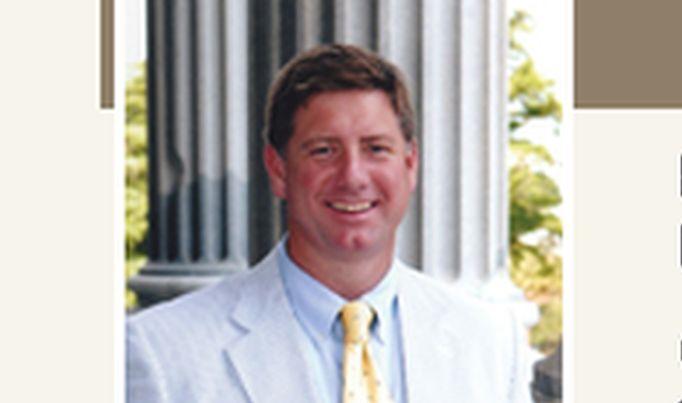Former South Carolina House Majority Leader Jim Merrill is accused of using his position for personal benefit, a prosecutor who’s been investigating possible corruption at the Statehouse announced Wednesday.
A Richland County grand jury indicted the lawmaker on two counts of misconduct in office and 28 counts of violating state ethics laws, said Solicitor David Pascoe, a Democrat assigned to the investigation in 2014.
House Speaker Jay Lucas suspended Merrill from office, effective immediately, until he’s either cleared or vacates his seat.
A hearing has not been set, according to Pascoe’s statement, which specified he would “have no further comment.”
Merrill’s attorneys said the 49-year-old Charleston Republican “adamantly denies” the charges and looks forward to defending himself in court.
“The work performed by Jim Merrill’s private company was completely legal and legitimate,” attorneys Matthew Hubbell and Leon Stavrinakis said in a joint statement. They note that in South Carolina, being a legislator is considered part-time.
Some of the accusations are reminiscent of allegations Gov. Nikki Haley successfully sidestepped in 2012, when the then-GOP-dominated House Ethics Committee twice cleared her, and the state Supreme Court ruled that legislators, not courts, should handle citizen complaints against elected representatives.
Merrill, a state political adviser to Donald Trump during the presidential primary, had no primary or Democratic opponent this year. First elected in 2000, he served as majority leader from 2004 to 2008.
The charges involve Merrill’s GOP leadership role and his public relations company, Geechie Communications. He’s accused of lobbying for companies as a legislator, not reporting income from them on campaign disclosures, and overcharging the House GOP caucus for work his company performed for GOP candidates.
Merrill’s attorneys point to nonbinding legal opinions from the House Ethics Committee and Attorney General Alan Wilson that it’s not illegal for a House caucus to hire and pay a majority leader’s business.
“For over 20 years, his vocation and livelihood have been in the field of advertising, direct mail, and public relations,” their statement said.
The indictments include allegations that Merrill billed the caucus and the former House speaker’s defunct political action committee more than $275,500 between 2005 and 2011 for candidate mailings and election ad placements, “often adding a markup of more than 50 percent.”
One count alleges he “laundered” about $149,000 to his company from the Charleston Area Convention and Visitors Bureau, which receives money from the state’s tourism agency, while he was chairman of a House budget-writing panel.
Merrill also is accused of acting as a lobbyist for the state Association of Realtors, which paid him more than $391,000 between 2008 and 2012, during which he sponsored legislation the indictment calls beneficial to the association and participated in a conference call that sought funding for property tax reform.
The indictments also accuse him of lobbying for Student Transportation of America, which paid him $172,500 between 2011 and 2016, and accepting $43,000 from an engineering company in exchange for helping the firm.
He’s also accused of not reporting income from those and other clients, including the state Manufacturers Alliance and the state Trial Lawyers Association.
The indictments come two years after former House Speaker Bobby Harrell, R-Charleston, pleaded guilty to misdemeanor ethics violations and resigned from office. The deal also required him to cooperate with ongoing Statehouse investigations.
After Harrell’s plea, state police released a heavily redacted investigative report, citing a public records law provision exempting the release of information to be used in a future or likely law enforcement action.
Wednesday’s announcement marks the first indictment since then — five months after the state Supreme Court affirmed Pascoe’s role.
Attorney General Wilson, a Republican, handed off the Harrell investigation to Pascoe in 2014, citing an unidentified conflict. But Wilson fired Pascoe in March, saying the chief prosecutor for Orangeburg, Calhoun and Dorchester counties lacked the authority to open a state grand jury to investigate the report’s blacked-out portions. The justices disagreed.
In 2012, a legislative committee cleared Haley of accusations she lobbied for two employers, a hospital and an engineering firm, while a House member and did not report that income on campaign disclosures. She argued successfully that state law didn’t require her to report the income, her work didn’t meet the legal definition of lobbying and there was nothing illegal about asking lobbyists to donate to the hospital’s nonprofit, since she wasn’t paid on commission.
While the engineering firm had state contracts, its vice president testified Haley was paid $48,000 to bring in private sector business, despite bringing in no new actual business. She was paid a $110,000 salary to raise money for the hospital’s foundation.
After she was cleared, Haley pushed for reforms, agreeing with her colleagues that the state’s ethics laws are too vague. While the Legislature passed ethics changes earlier this year, none of them addressed lobbying.





